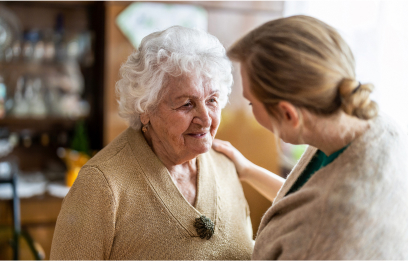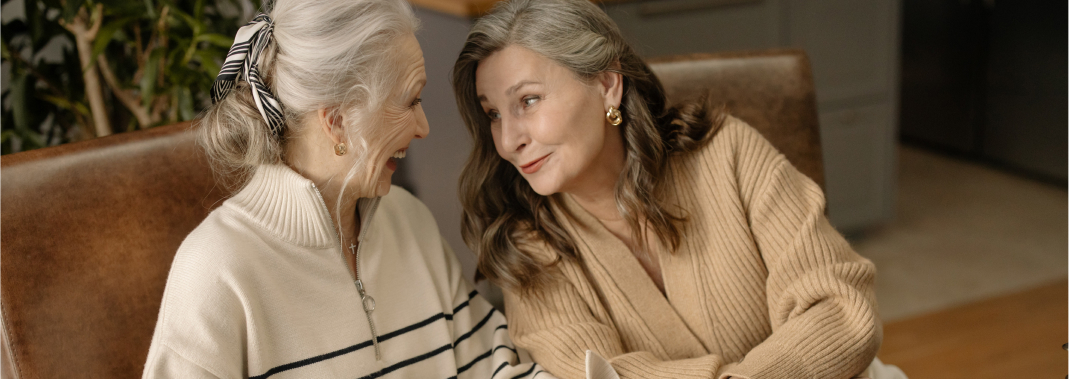
Communication is key to staying in touch and sharing information with each other. We do so at home, at work, or when out and about in the community. It’s easy to feel stressed by all of the messages you receive. They happen on the phone, in person, and via text or email. Sometimes you even get a handwritten note!
Of course, the reason we stay in touch is to share information, make plans, solve problems, and hopefully, share loving thoughts. All of this goes well until it doesn’t, as in the case of misunderstanding. That can happen when people have different primary languages, or when one is hard of hearing. The list goes on of why some messages are confusing or upsetting. That’s can especially happen when talking with seniors, or when a person is ill or under a lot of stress.
This blog is devoted to communication, including its value for families and caregivers. It includes tips for sending clear messages, ways to talk with seniors, and how our uCareLINGO apps assist in sending and receiving clear, thorough messages. Our goal is to support the care you and families provide for Canadian seniors and patients living at home.
The Value of Clear Communication
As you’ll read in this blog’s next section, there’s a lot of information you share as a caregiver. Families depend on you to do so for a number of reasons.
- A family may need to make quick decisions, such as getting a doctor’s appointment for their loved one. Or perhaps a prescription needs to be quickly refilled.
- Someone may need to call for emergency help.
- Timely care for a senior can reduce the chance of them being admitted to the hospital.
- The primary family caregiver may need to change their work schedule to spend more time caring for their loved one.
- A family might need to make decisions such as increasing the number of days or hours you care for their senior member.
- A family may decide to have a meeting with each other or a social worker or attorney to assist with making the best decisions.
Besides the impact of clear messages for a family, there are system-wide benefits when you communicate your observations. Some of these are:
- Reduced hospitalizations of elders means less stress for individuals and better use of the healthcare system.
- More efficient use of primary care providers and social services.
- Families and healthcare providers can track a senior’s health data over time. Examples include:
- Vital signs and activity patterns
- Sleep and nutrition consistency or changes
- Changes in thinking ability, confusion, or acting out
- When there are changes with some information it can mean that:
- A senior has an acute illness like a urinary tract infection or pneumonia
- They have new signs of dementia
- They may need to have the dose or frequency of a medication changed
- They need to have an exam and lab tests
Tips for Caregiver Communication: Types of Information
You already know how much it means when someone is clear when they talk with you or send a text. You know how to talk with seniors, looking them in the eye and speaking in a clear, low voice. You engage them with a gentle touch and smile. Or shake your head a bit to make sure your safety message is very clear!
Just think of how much of these interactions a family wants to know. A lot of it they need to know to best plan their loved one’s care. After all, they know that changes are likely to happen in the coming months.
Because of the responsibilities they share with you, there’s a long list of things that a senior’s or patient’s family needs to know each day, such as:
- How their loved one’s day went in general.
- What they ate and drank and how much of each.
- The types of personal care they received.
- Their ability to take their medications with just a couple of prompts.
- Activities they did, like playing cards or listening to you read.
- Household tasks that were done on their behalf.
On top of these, there might be a concern about a loved one’s health or well-being, in which case the family wants to know if their senior loved one:
- Had a fever or new trouble breathing.
- Refused to eat or drank less water than usual.
- Complained about a new pain, nausea, or other sign of illness.
- Was more confused or agitated than usual, or their mood seemed different.
- Had any form of accident, such as a fall or toileting mishap.
- Showed any change in ability, such as increased weakness or slurred speech.
As you know, some of this information needs to be communicated immediately. Our uCareLINGO app supports you with doing that too! For instance, you can reach out to a family in real-time so they can make a decision about what to do. Being able to act and respond quickly like this is to everyone’s benefit, including a reduction in unneeded emergency room visits or hospitalizations.
Improve Caregiver Communication Skills
When you think about it, the communication skills you use are for the benefit of families and for your caregiving practice. As families realize they can rely on you for timely, accurate information, their confidence in your services increases. From a business perspective, you can share this benefit with potential clients, letting them know about your excellent communication. When you describe how you rely on the uCareLINGO apps, they’ll become aware of the extra level of care you provide.
Tips for Communicating with Seniors
You are well aware of the steps that support clear communication with seniors and people who are quite ill. Even then, sometimes talking with a person can be a challenge due to language differences or that it’s hard for a person to think clearly.
- Our app has icons and voice translation that help with conversation.
- You’re able to find out what you need to know.
- The person you’re caring for is less stressed as they can more easily let you know about their needs.
- The family and person in your care quickly learn the benefits of using the app for sharing information.
Sharing Information About a Loved One
Fortunately, we have the apps to assist your communication with families and theirs with you! The ability for you and families to be able to readily reach out to each other reduces their worries as it increases their confidence in home care for their loved one. They have added security knowing that using uCareLINGO is protected, adding another aspect of security. This enhanced communication has a positive affect on your relationship with families.
- Some days they might reach out to you while they’re at work. They simply want to know how the day is going.
- Their ability to monitor the quality of care and wellness information supports family members who live at a distance.
- It means a lot to the family to be able to share reports on their loved one’s health and wellness with doctors.
- These are steps that help to improve their loved one’s health outcomes and goal of living at home as long as possible. Hopefully for the remainder of their days.
Your Skills and Technology Use Help Families Find You!
Your role as a home caregiver and personal support worker is central to improving care for seniors and those wishing to stay at home when ill. There are many families who are seeking the services and skilled knowledge of caregivers like you. uCareLINGO apps let families view and reach out to caregivers in their area. Once they hire you, all of your interactions become efficient and done in a timely manner for both of you. This is one more way that the families you serve are grateful for you and your caring skills!


